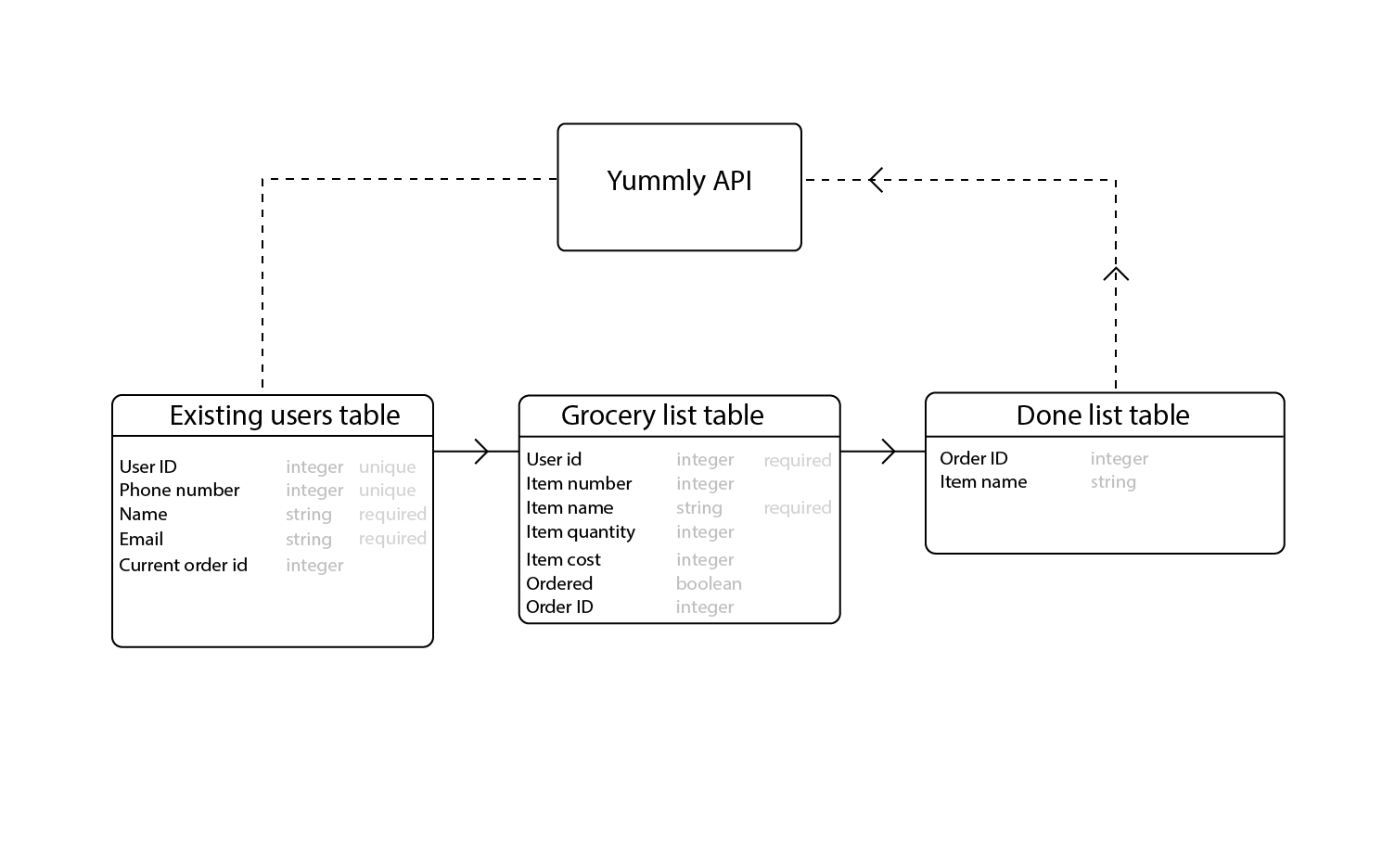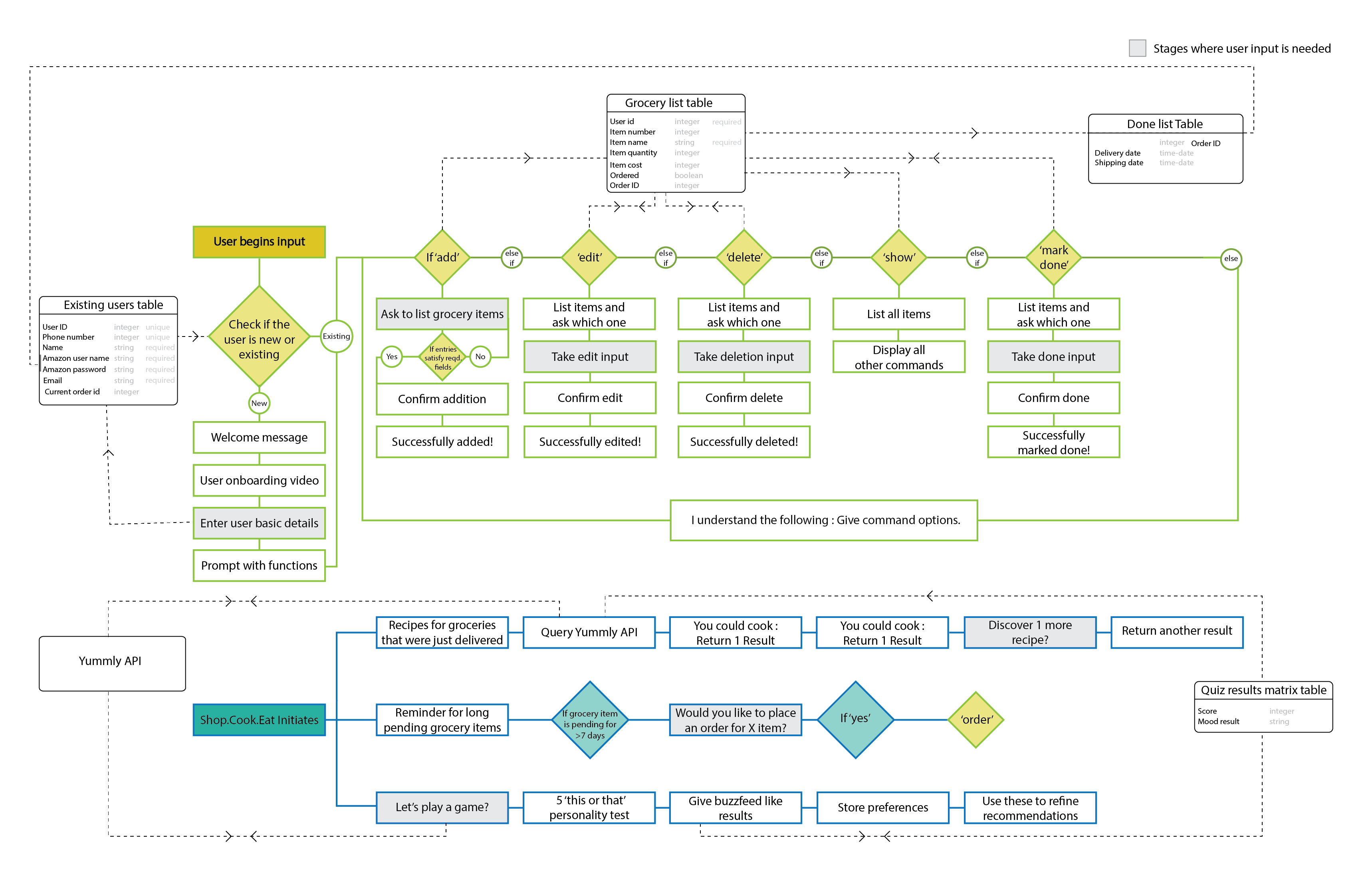module Sinatra
module CommandsHelper
# ------------------------------------------------------------------------
# => MAPS THE CURRENT EVENT TO AN ACTION
# ------------------------------------------------------------------------
def event_to_action client, event
puts event
puts "Formatted Text: #{event.formatted_text}"
return if event.formatted_text.nil?
is_admin = is_admin_or_owner client, event
# ------------------------------------------------------------------------
# Hi Commands
# ------------------------------------------------------------------------
if ["hi", "hey", "hello"].any? { |w| event.formatted_text.starts_with? w }
client.chat_postMessage(channel: event.channel, text: "Hi! I am Ginger. I can help you keep a grocery list.\n You can say `add` , `edit`, `delete`, `mark done`or `show list` ", as_user: true)
# ------------------------------------------------------------------------
# Add Commands
# ------------------------------------------------------------------------
elsif event.formatted_text == "add"
client.chat_postMessage(channel: event.channel, text:"Tell me one or multiple things you want to add to your grocery list. \n `Example: add potato, milk carton, cherries, chips` ", as_user: true )
elsif event.formatted_text.starts_with? "add"
# we want to take the add part away
# and then the rest we wanna add to our database
items = event.formatted_text.gsub( "add", "" ).strip
items.split( "," ).each do |item|
listed = GroceryList.create( item_name: item )
listed.item_quantity = 1
listed.save
end
# print the list
all_items = GroceryList.order(:id)
grocery_list = ""
all_items.each_with_index do |item, index|
grocery_list += "*#{ index+ 1 }.* #{ item.item_name } \n"
end
client.chat_postMessage(channel: event.channel, text: "I've added that to you list.\n*Your updated list is as follows:*\n" + grocery_list , as_user: true )
# ------------------------------------------------------------------------
#Edit Commands
# ------------------------------------------------------------------------
elsif event.formatted_text == "edit"
# print the list
all_items = GroceryList.order(:id)
grocery_list = ""
all_items.each_with_index do |item, index|
grocery_list += "*#{ index+ 1 }.* #{ item.item_name } \n"
end
client.chat_postMessage(channel: event.channel, text: "\n*Your grocery list is as follows:*\n" + grocery_list +"\nWhich one do you want to *edit*? \n`Example: edit 4 to potatoes`" , as_user: true )
elsif event.formatted_text.starts_with? "edit"
# we want to take the edit part away
# and then the rest we want to use for editing
input = event.formatted_text.gsub( "edit", "" ).strip
input_words = input.split
#getting the index number user wants to edit
input_index = input_words[0].to_i - 1
#removing the index number from string
input_words.shift
all_items = GroceryList.order(:id)
#checking if the input exists in the list at all
if input_index<=0 or input_index>all_items.length
text = "\nI think you asked me to edit something that's not on your list. \nYou can say, `edit 1 to eggs`"
#checking if user has followed 'to' syntax
elsif input_words[0].to_s == "to"
#removing the 'to' to get just the new edited entry
input_words.shift
grocery_string = input_words.join(" ")
#saving the edit
all_items[input_index].item_name = grocery_string
all_items[input_index].save
#display edited list
grocery_list = ""
edited_list = GroceryList.order(:id)
edited_list.each_with_index do |item, index|
grocery_list += "*#{ index+ 1 }.* #{ item.item_name } \n"
end
text = "\nSure, I made the edit! *Your grocery list now looks like this:*\n" + grocery_list
else
text = "\nI can make the edit right away. Say something like ' *edit* 1 *to* eggs '"
end
client.chat_postMessage(channel: event.channel, text: text , as_user: true )
# ------------------------------------------------------------------------
#Delete Commands
# ------------------------------------------------------------------------
elsif event.formatted_text == "delete"
# print the list
all_items = GroceryList.order(:id)
grocery_list = ""
all_items.each_with_index do |item, index|
grocery_list += "*#{ index+ 1 }.* #{ item.item_name } \n"
end
client.chat_postMessage(channel: event.channel, text: "\n*Your grocery list is as follows:*\n" + grocery_list +"\n\nWhich one/ones do you want to *delete*? \n`Example: delete 4`" , as_user: true )
elsif event.formatted_text == "delete all"
client.chat_postMessage(channel: event.channel, text: "Are you sure you want to delete you *entire list*? Say `yes delete` or `no don't`" , as_user: true )
elsif ["yes delete", "yes, delete.", "yes, delete","yes del","yes please"].any? { |w| event.formatted_text.starts_with? w }
GroceryList.destroy_all
client.chat_postMessage(channel: event.channel, text: "Okay, I just cleaned up your entire grocery list. You're good to start a fresh new list!" , as_user: true )
elsif ["no don't", "no dont", "no, don't","no, dont","dont", "no"].any? { |w| event.formatted_text.starts_with? w }
client.chat_postMessage(channel: event.channel, text: "Don't worry! I won't delete anything till you're absolutely sure you are done with this one!" , as_user: true )
elsif event.formatted_text.starts_with? "delete"
text= ""
error_text =""
# we want to take the add part away
# and then the rest we wanna add to our database
items = event.formatted_text.gsub( "delete", "" ).strip
all_items = GroceryList.order(:id)
flag = 0
items.split( "," ).each do |num|
#checking if the input exists in the list at all
if num.to_i>0 and num.to_i<all_items.length+1
i= (num.to_i)-1
all_items[i].destroy
flag = 1
else
#error text if one or more are not valid indexes
error_text = "I think one or more of those entries that you asked for don't exist on your list.Please check if you mistyped."
end
end
redefined_list = GroceryList.order(:id)
#if no error
if error_text == ""
grocery_list = ""
redefined_list.each_with_index do |item, index|
grocery_list += "*#{ index+ 1 }.* #{ item.item_name } \n"
end
text= "Okay, I've deleted that from your list. \n*Your updated list is as follows:*\n" + grocery_list
#if there are some indexes that exist and some that don't
elsif flag ==1
grocery_list = ""
redefined_list.each_with_index do |item, index|
grocery_list += "*#{ index+ 1 }.* #{ item.item_name } \n"
end
text= "I've deleted some things you asked me to. \nBut " + error_text + " \n*Your updated list is as follows:*\n" + grocery_list
#if all indexes don't exist in the list
else
text = error_text
end
client.chat_postMessage(channel: event.channel, text: text, as_user: true )
# ------------------------------------------------------------------------
#Show Command
# ------------------------------------------------------------------------
elsif ["show", "list", "display", "grocery list", "show list" " show grocery list", "grocery"].any? { |w| event.formatted_text.starts_with? w }
# print the list
if GroceryList.all.empty?
client.chat_postMessage(channel: event.channel, text: "\nYour grocery list is empty and clean to start adding things right away! \n For example, you can say `add eggs`" , as_user: true )
else
all_items = GroceryList.order(:id)
grocery_list = ""
all_items.each_with_index do |item, index|
grocery_list += "*#{ index+ 1 }.* #{ item.item_name } \n"
end
client.chat_postMessage(channel: event.channel, text: "\n*Your grocery list :*\n" + grocery_list , as_user: true )
end
# ------------------------------------------------------------------------
#Mark Done Command
# ------------------------------------------------------------------------
elsif event.formatted_text == "mark done"
client.chat_postMessage(channel: event.channel, text: "Awesome, you got things done?\nTell me which ones and I'll strike them out right away. \nYou can say `mark done 4,5`" , as_user: true )
elsif event.formatted_text.starts_with? "mark done"
input = event.formatted_text.gsub( "mark done", "" ).strip
done_list = ""
done_item = ""
recipe_ingredient = ""
recipe = ""
#variables for customizing text received for different error scenarios in mark done
flag =0
error_text = ""
text =""
all_items = GroceryList.order(:id)
input.split( "," ).each do |num|
#checking if all input indexes exist in the list
if num.to_i>0 and num.to_i<all_items.length+1
i= (num.to_i)-1
done_item = all_items[i][:item_name]
recipe_ingredient = done_item
done_list += done_item+"\n"
all_items[i].destroy
flag = 1
else
#error text if one or more are not valid indexes
error_text = "I think one or more of those entries that you asked for don't exist on your list.Please check if you mistyped."
end
end
#if no error
if error_text == ""
remaining_items = GroceryList.order(:id)
remaining_list = ""
remaining_items.each_with_index do |item, index|
remaining_list += "*#{ index+ 1 }.* #{ item.item_name } \n"
end
yummly_app_id = '19a71c98'
yummly_app_key = 'a3bdaf1de2b3acbb2abcb8755b214874'
# Accessing Yummly API
base_url = "https://api.yummly.com/v1/api/recipes?_app_id=#{yummly_app_id}&_app_key=#{yummly_app_key}&requirePictures=true"
base_url+="&allowedIngredient="+recipe_ingredient
url = URI.parse(URI.encode(base_url.strip))
response = HTTParty.get(url)
data = JSON.parse(response.body)
# this gets me the matches element from the JSON response
recipe_options = data["matches"]
recipe_names = "Try this recipe: \n"
recipe = recipe_options.sample(1).first
name = recipe["recipeName"]
image = recipe["smallImageUrls"].first
url = "http://www.yummly.co/#recipe/" + recipe["id"]
ingredients = recipe["ingredients"].join( ", ")
recipe_names += "*#{name}*" + " \n#{url } \n#{image} \nMade with: #{ingredients}"
text= "Awesome! I noted that the following are done:\n" + done_list + "*Now your remaining list looks like this:*\n "+ remaining_list +"\nAlso, Here's an awesome recipe that uses "+ recipe_ingredient+ ".\n" +recipe_names
else
text = "Umm, I'd be happy to mark things done on the list, but some of those things don't exist on your list. Please check if you mistyped."
end
client.chat_postMessage(channel: event.channel, text: text, as_user: true )
# ------------------------------------------------------------------------
#Thanks Response
# ------------------------------------------------------------------------
elsif event.formatted_text.starts_with? "thank"
text = ""
responses =["You're very welcome", "You're most welcome", "Welcome!", "Oh, mention not :)" ]
text = responses.sample
client.chat_postMessage(channel: event.channel, text: text, as_user: true)
# ------------------------------------------------------------------------
#Appreciation Response
# ------------------------------------------------------------------------
elsif ["awesome", "great", "brilliant", "good", "okay", ":+1:"].any? { |w| event.formatted_text.starts_with? w }
client.chat_postMessage(channel: event.channel, text: "Happy to help. I'm always there for you!", as_user: true)
# ------------------------------------------------------------------------
#Help Response
# ------------------------------------------------------------------------
elsif event.formatted_text.starts_with? "help"
client.chat_postMessage(channel: event.channel, text: "I am Ginger, a grocery list bot.\n You can say `add` , `edit`, `delete`, `mark done`or `show list` " , as_user: true)
# ------------------------------------------------------------------------
#Error Response
# ------------------------------------------------------------------------
else
# ERROR Commands
# not understood or an error
client.chat_postMessage(channel: event.channel, text: "I didn't get that. If you're stuck, type `help` to find my commands.", as_user: true)
end
end
# ------------------------------------------------------------------------
# GETS USEFUL INFO FROM SLACK
# ------------------------------------------------------------------------
def get_user_name client, event
# calls users_info on slack
info = client.users_info(user: event.user_id )
info['user']['name']
end
def is_admin_or_owner client, event
# calls users_info on slack
info = client.users_info(user: event.user_id )
info['user']['is_admin'] || info['user']['is_owner']
end
end
end
Click to Expand


